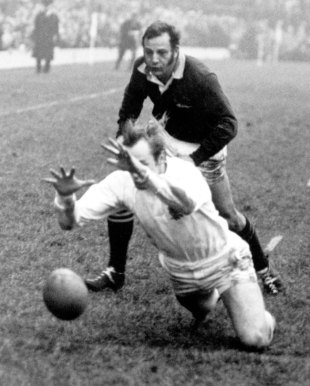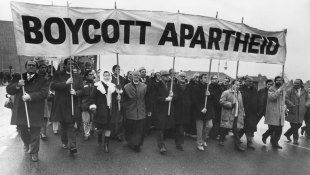|
England v South Africa, Twickenham, 1969
A last-gasp winner and a hijacked bus
Martin Williamson
December 20, 1969

David Duckham pounces on a loose ball
© PA Photos Enlarge
England's narrow victory over South Africa at Twickenham was their first in six attempts at home since the Springboks' first tour in 1906. But it was a match completely overshadowed by political rows and often violent protests against the tourists who many felt should not be in the country at all. From the start, anti-apartheid campaigners - mainly students - had targeted the tour. A year earlier England's cricket tour of South Africa had been scrapped in what was known as the D'Oliveira affair, and with the South African rugby team visiting in 1969-70 and the cricket team following straight on after, feelings were high. Early on weedkiller was poured onto pitches, leading to high levels of security being needed in the build-up to matches. A normally low-key midweek game in Lancashire took place against a surreal backdrop as 7000 protestors battled with 2000 policemen outside the ground; a week later 98 people were arrested following a pitch invasion in Aberdeen. As the disturbances continued hotels cancelled bookings by the tour party, a match in Belfast was cancelled on security grounds, and every game was played in an atmosphere of violence and heavy policing. The Home Nation boards held firm and backed the tour, using the age-old "politics and sport don't mix" defence. But the damage to the image of the game grew with each news bulletin and the rugby became increasingly inconsequential. On the morning of the match at Twickenham the South African squad boarded their team coach to head to the ground. A man they assumed to be the driver got on, started the engine and pulled away from the central London hotel. Only then did several players flag that a number of the party were still not there; within seconds they realised the man driving was a protestor. A fight ensued as they battled him for control and eventually the coach crashed into parked cars. "We spent all our time surrounded by police cordons and barbed wire, never mind having our bus hijacked," Springbok No. 8 Tommy Bedford said. It was a shaken team which eventually arrived at Twickenham.

Anti-apartheid protesters march on Twickenham
© Getty Images
Enlarge
The authorities did well to prevent any disturbances inside the ground and the game itself was trouble free. The Spingboks started the brighter side and dominated the first half. They controlled the line-outs and scrums and it was only in the closing minutes of the half England put them under any sustained pressure. But although England grew more confident it was South Africa who scored the first try, Piet Greyling going over in the corner after England had failed to cope with a high ball, only for England to bounce straight back with a try of their own, lock Peter Larter starting and finishing a running move. Had Piet Visagie, who slotted South Africa's conversion, not taken an age over a drop-goal attempt in the dying seconds and allowed Nigel Starmer-Smith to charge down his kick, the tourists' lead would have been greater than 8-3. The second half was the reverse as England came charging back, their pack fitter and stronger forcing the Springboks onto the back foot. Their defence held firm although their handling grew ragged. As the game went on England only had a Bob Hiller penalty to show for their effort and still trailed by two points. England finally broke through late on when hooker John Pullin pounced on a loose ball and dived over for the try. Hiller kicked the conversion from the touchline to give them a three-point lead but the final minutes were all South African attacks and desperate English defence, the tension heightened when fullback Hiller had to go off for a few minutes leaving them a man down. The tour continued amid continuing unrest - draws against Wales and Ireland followed - but it was to be almost 26 years before South Africa's next clash against England at Twickenham. © ESPN Sports Media Ltd. Managing Editor, ESPN EMEA Digital Media
| |||||||||||||||
Live Sports
Communication error please reload the page.
-
Football
-
Cricket
-
Rugby
-
- Days
- Hrs
- Mins
- Secs
F1 - Abu Dhabi GP
Abu Dhabi Grand Prix December 11-131. Max Verstappen ()
2. Valtteri Bottas (Mercedes)
3. Lewis Hamilton (Mercedes)
4. Alexander Albon ()
5. Lando Norris ()
6. Carlos Sainz Jr ()
-
ESPNOtherLive >>
Golf - Houston Open
Snooker - China Open
Tennis - Miami Open

